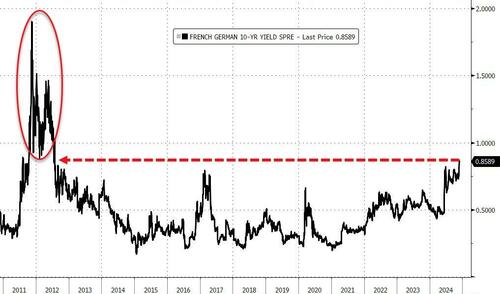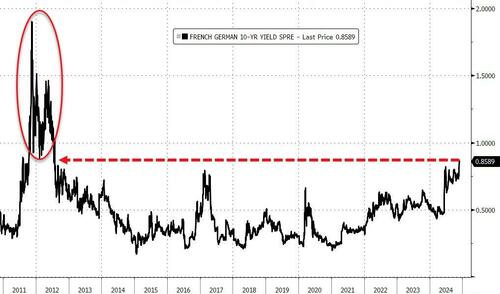Frexit Fears Reignite As Market “Storm” Drives Core EU Spreads To Crisis Highs
Merde alors, as they say in Paris!!
Amid a battle over the country’s budget and an ongoing fiscal crisis, France’s 10Y yield spread to Germany’s has soared up to over 85bps – its highest since the European financial crisis – reigniting ‘Frexit’ fears as decoupling of the core countries accelerates…
Source: Bloomberg
The French government risks facing higher borrowing costs as its lack of a majority in Parliament makes it harder to implement spending curbs and tax hikes needed to curb a ballooning budget deficit.
Michel Barnier, right, with Finance Minister Antoine Armand in Paris on Oct. 15
French Prime Minister Michel Barnier said the country faces “storm” in financial markets if an “unlikely but possible” alliance of lawmakers across the political spectrum rejects his government’s budget proposals and votes it out of power.
“There will probably be a rather serious storm and serious turbulences in financial markets” in case of a no-confidence vote, Barnier said in an interview with French TV channel TF1.
“If the government falls, emergency measures will be taken,” which won’t cover full-year expenses.
Specifically, as Bloomberg reports, the premier’s political survival hangs on whether French far-right leader Marine Le Pen’s will back a potential no-confidence vote when he presents final versions of the 2025 government and social-security budget bills in coming days and weeks.
Le Pen has vowed to bring down his administration if her demands to better protect household purchasing power aren’t met.
Barnier went on TV Tuesday night after his boss, President Emmanuel Macron, reportedly said he believed that Le Pen would carry out her threats, and that Barnier would soon be out. Macron’s office denied he made such comments.
Le Pen has focused her ire on the government’s plan to increase taxes on electricity, to lower reimbursements for medicine, and to postpone the indexation of pensions to inflation.
She has also demanded additional measures on immigration.
In a bid to assuage Le Pen’s party, Barnier said Tuesday that electricity prices will fall by 9% next year, “and we’ll see if we can do more to preserve the purchasing power of the French.”
Le Pen has recently hardened her tone, threatening to topple the government while playing down the negative consequences of a no-confidence vote.
“We could very well come to a situation where the government is again put into jeopardy,” said Greg Hirt, global chief investment officer for multi asset at Allianz Global Investors.
The path to installing a new government remains unclear.
It took months for Macron to appoint a prime minister this summer after losing his majority in the French parliament earlier in the year.
Emergency measures that could be taken by an interim government would prevent “neither a crisis, nor the mistrust of financial markets,” Barnier said.
There could be a new budget bill, “but we don’t have time to lose.”
“Besides the recent political headlines underscoring that the budget agreement will become difficult and could bring the government down, the macro outlook is also deteriorating quickly,” Christoph Rieger, Commerzbank’s head of rates and credit research, wrote in a note.
France’s finances are about to face scrutiny from S&P Global Ratings on Friday, which could be the next catalyst for market moves, after both Fitch Ratings and Moody’s Ratings gave it a negative outlook last month.
Tyler Durden
Wed, 11/27/2024 – 08:26



